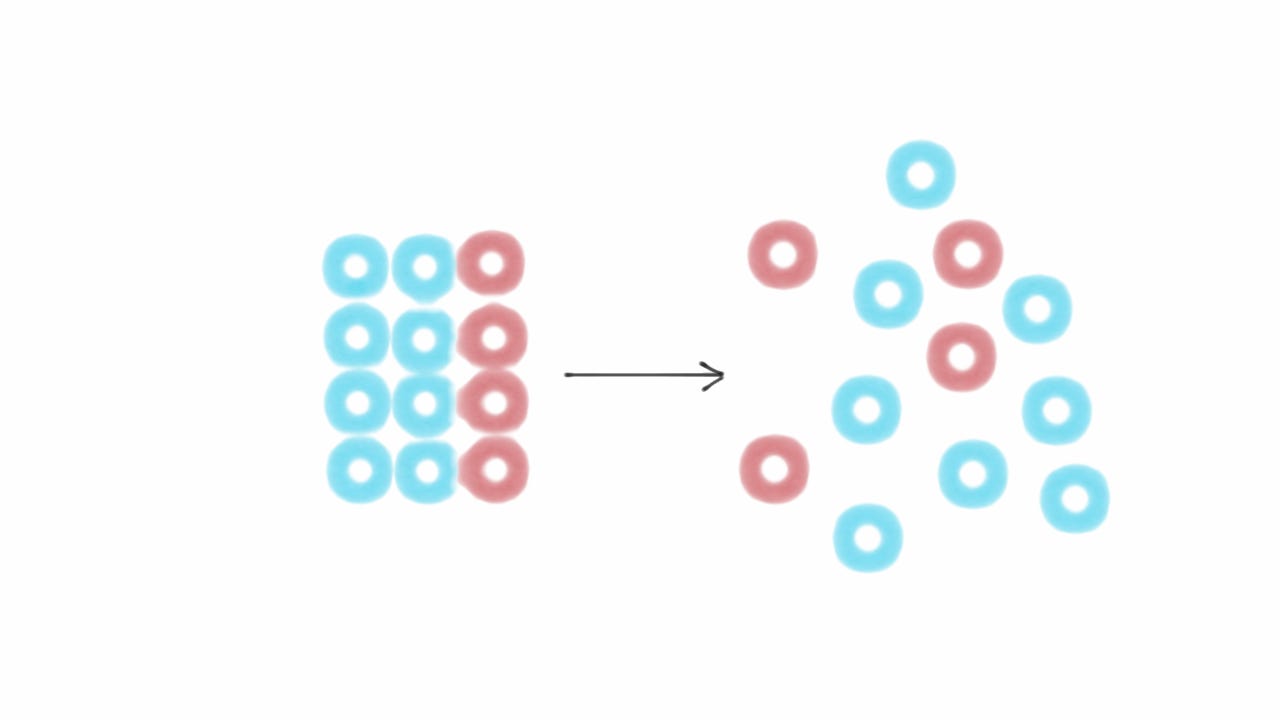The universe trends towards disorder. The second law of thermodynamics. Entropy: it takes work to keep something in its current state. This is why the living room gets dirty, why bike tires need refilling, why people lose touch. Energy spreads out.
A friend once told me that everyone is either a control freak or an escape artist. I was dubious but went on to think about it pretty much all the time, and it strikes me now that control and escapism are the two opposing responses to entropy: we either cope with chaos through vigilant organization, or do what we can to avoid chaos by disappearing into it. (This is admittedly a bit reductive and betrays my bias which is of course that I’m a control freak: the bed should be made immediately upon exiting it; there’s only one way to do triangle pose.)
The problem is that no matter how hard you try, things don’t stay where you put them. It didn’t used to bother me so much, but another characteristic of entropy is that disorder accrues, which I can describe only by showing you this video:
As time passes, things get farther from where they started. This is the abiding way that I’m experiencing middle age. The skin around my eyes and the circumference around my waist are obvious examples of disorder, but what’s more pernicious is the fact that I’ve been trying to write a newsletter for six weeks and every time I begin, my gaze goes uncontrollably elsewhere to find something that’s moved from where I put it—a dust bunny, an email, a plan, a dollar. In getting older I don’t necessarily feel less focused or agile, but I do have an acute sense that the distance between intention and realization is increasing.
The first law of thermodynamics is more comforting. Energy cannot be created or destroyed. I’m not sure what this means in terms of physics, but it rings with a certain relational truth. Energy can be transferred.
My teacher Richard Freeman once said that presence is what happens when someone you respect walks into the room. I remember very clearly the room I was in when he said this. I remember also where my body was in the room, and where his body was. Presence is physical and it transfers between people gesturally: the eyes steady, the ears open, the fronts of the armpits lift. These physical changes mirror (or are mirrored by?) the mind, which can funnel into a single point. What I’m trying to say is that lucidity organizes things, from messy to neat, in opposition to entropy, and in a way that I understand as being pretty much just like this:
Energy moves between objects and people and solid things and invisible things. (It’s seems intuitive that this is also the way solar systems are arranged, by vibrations in space (also just FYI I’m not high right now.)) Here’s the other thing: after the vibration, there’s no possible method by which the grains of sand can return to where they began. Also entropy: things can’t go back to how they were.
Maybe it’s in response to this that we create the different organizing principles of life. Yoga and writing are good ones and there’s a million more and they all rely on arranging energy (through body parts, words, colors, flavors, numbers, routines, communities) in a way that’s just-so. When we succeed at creating order without motivations of control or escape, energy coalesces into sublime patterns.
I remember being surprised in grad school to hear writers talk about writing as a practice in the same way that meditators speak of meditating. It makes sense though and any practice is characterized by one thing: repetition. The ritual of doing something over and over not only creates a place to put your foot down, but also (hopefully) teaches a flexibility and readiness for when that place inevitably falls apart. So it’s a paradox, or it spans both sides of the pair of opposites between control and escape—ritual creates a mooring in the sea of flux, and it also helps us feel that we are flux.
Turning forty I’ve begun to realize just how much I’ve lived with an unexamined assumption that life leads inexorably towards something. Of course it does, but the awareness that that something is spread out and not focused in is pretty consistently blowing my mind.
In sitting practice, it can be disproportionately helpful just to remember that sitting practice is hard. It takes energy to keep the body where it is, and remembering this somehow gives me permission to try—it’s like sometimes I can say to myself hey bro pull it together and just don’t move. For however difficult that can be, which is infinite in my experience, the other thing of course is that energy can’t be destroyed. So you don’t lose energy by using it. Sitting up straight gives you the energy you need to try. Doing hard things provides the energy it requires. It’s worth it to clean the living room even though it won’t stay clean. (Sisyphus is still laughing.) But when it comes down to it I think the ultimate goal is just to be the kind of person who hums along in a way that organizes sand into cool patterns.




